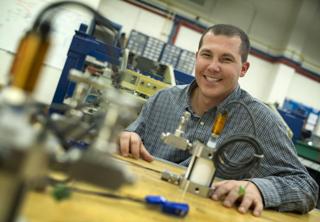May 30 2015
A University of Texas at Arlington engineering researcher is working to determine how oversized a battery has to be while operating safely and efficiently during its lifetime of use by the U.S. Navy.
 This is David Wetz, a UT Arlington associate professor of electrical engineering. (credit: UT Arlington)
This is David Wetz, a UT Arlington associate professor of electrical engineering. (credit: UT Arlington)
David Wetz, associate professor of electrical engineering, is principal investigator for an $801,224 Office of Naval Research grant that investigates how batteries age when they’re run at high rates.
The project is one of more than a half-dozen grants Wetz has been working on during the last few years that total more than $2 million in funding.
All of the research has to do with batteries – fundamentally understanding their limits, electrically and thermally, when operated at high power.
“The keys for the Navy are safety, size and weight due to the limited amount of room on a ship. To fit within the space, the batteries often need to be run at higher power to accomplish the mission even if that results in a slightly shorter battery lifetime,” Wetz said. “This work is different from most other battery research – for cell phones, cars or even the grid for example – since in those applications safety and lifetime are key so that consumers are not burdened with the frequent cost of replacement.”
Khosrow Behbehani, dean of the UT Arlington College of Engineering, said Wetz’s research is vital to Naval concerns.
“What Dr. Wetz discovers has implications for both the Navy as well as industrial applications,” Behbehani said. “Batteries certainly have to be dependable and powerful when being designed or tested for the U.S. Navy. But the applications of high-power and long-lasting batteries are numerous and range from transportation to fault-tolerant power distribution, and to renewable energy.”
As mentioned, Wetz’s Pulsed Power and Energy Laboratory has received important Office of Naval Research funding during the last couple of years, including:
- A $185,000 ONR grant to design and evaluate controls for a 1000 volts-direct-current lead-acid battery for use in shipboard applications.
- A $320,000 ONR grant to understand the challenges faced when implementing a 1000 volts-direct-current lithium-ion battery.
- A $180,000 ONR Defense University Instrumentation Program grant to purchase a high-rate commercial battery cycler and environmental chambers to support the research.
- $200,000 in ONR grants over a three-year period to simulate, design and evaluate a high power Hybrid Energy Storage Module.
- $100,000 in ONR grants over a two-year period to study the impact of high-pulsed magnetic fields on the corrosion rates of metallic alloys.
- $250,000 in ONR grants over a two-year period, in strong collaboration with Mechanical and Aerospace Engineering Assistant Professor Ankur Jain’s Microscale Thermophysics Laboratory, to characterize the thermal properties of cylindrical lithium-ion batteries.
- A $288,000 ONR DURIP grant, along with Dr. Jain, to buy equipment that enhances the quality of the thermal characterization of batteries.
The work started with Wetz’s $508,000 ONR Young Investigator Award in 2011 to explore battery performance and aging at the fundamental cell level.